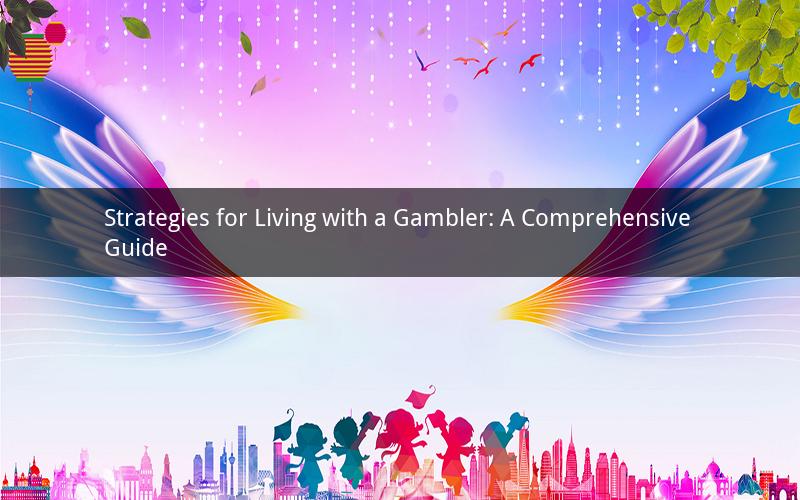
Living with a gambler can be challenging, but it's important to remember that you are not alone. Many people face this situation and have found ways to cope and thrive despite the difficulties. This guide will provide you with strategies and insights to help you navigate through this challenging phase of your life.
1. Educate Yourself About Gambling
Understanding the nature of gambling addiction is crucial in order to support your loved one effectively. Familiarize yourself with the signs and symptoms of gambling addiction, as well as the various treatment options available. This knowledge will enable you to provide appropriate support and create a conducive environment for recovery.
2. Establish Boundaries
Setting clear boundaries is essential in maintaining a healthy relationship with a gambler. Define what behaviors are acceptable and what are not, and communicate these boundaries to your loved one. Boundaries may include financial restrictions, limitations on visiting casinos or gaming websites, and specifying a curfew for gambling activities.
3. Develop Coping Mechanisms
Living with a gambler can be emotionally taxing. It's important to develop coping mechanisms to manage stress and anxiety. Engage in activities that promote relaxation and well-being, such as exercise, meditation, or hobbies. Additionally, consider seeking support from friends, family, or a therapist specializing in gambling addiction.
4. Encourage Professional Help
Encourage your loved one to seek professional help for their gambling addiction. Therapy, counseling, and support groups can provide them with the tools and support they need to overcome their addiction. Attend these sessions with your loved one, if possible, to offer emotional support and encouragement.
5. Focus on Self-Care
Taking care of yourself is crucial when living with a gambler. Ensure that you are attending to your own physical, emotional, and mental well-being. Surround yourself with a supportive network of friends and family who understand your situation and can provide the necessary support.
6. Create a Safe Environment
Work towards creating a safe and supportive environment for both yourself and your loved one. This may involve implementing financial safeguards, such as setting aside a budget for essential expenses, and seeking legal advice to protect your assets. Additionally, establish a safe space in your home where both of you can relax and communicate without interruption.
7. Be Patient and Understanding
Overcoming a gambling addiction is a long and challenging process. Be patient and understanding with your loved one as they navigate through the recovery journey. Avoid shaming or blaming them for their addiction, as this can hinder their progress. Instead, focus on offering support, empathy, and encouragement.
8. Educate Your Children
If you have children, it's important to educate them about gambling addiction and its impact on the family. Teach them about responsible gambling and the importance of seeking help if they feel they are developing a problem. Encourage them to share their feelings and concerns with you or a trusted adult.
9. Seek Support for Yourself
Living with a gambler can be overwhelming. Don't hesitate to seek support for yourself, whether it's through therapy, support groups, or counseling. Sharing your experiences and learning from others who have faced similar challenges can provide you with valuable insights and coping strategies.
10. Stay Informed
Stay informed about the latest research and treatment options for gambling addiction. This will enable you to provide the most up-to-date support to your loved one and make informed decisions about their recovery journey.
Questions and Answers:
1. Q: How can I help my loved one understand the impact of their gambling addiction on our relationship?
A: Communicate openly and honestly about the effects of their gambling on your life. Use "I" statements to express your feelings without placing blame. Offer examples of specific situations and explain how their behavior has affected you.
2. Q: Should I confront my loved one about their gambling addiction?
A: Yes, confrontation can be an effective way to initiate a conversation about their addiction. However, approach the situation with empathy and care. Choose a calm and private setting, and be prepared to listen to their perspective as well.
3. Q: Can I still be friends with my loved one if they have a gambling addiction?
A: It's possible to maintain a friendship with someone who has a gambling addiction, but it's important to set boundaries and ensure that your relationship does not enable their behavior. Keep in mind that your well-being should always be a priority.
4. Q: How can I protect myself financially when living with a gambler?
A: Consider seeking legal advice to establish financial safeguards, such as a joint account with restricted access or a power of attorney. Communicate openly about financial matters and set clear expectations regarding shared expenses.
5. Q: Is it possible to rebuild trust after a gambling addiction?
A: Rebuilding trust is possible, but it requires time, effort, and commitment from both parties. Encourage your loved one to be transparent and accountable for their actions. Focus on positive behavior changes and celebrate milestones in their recovery journey.